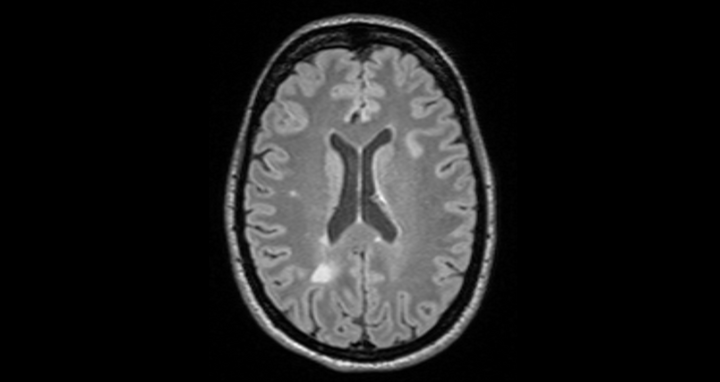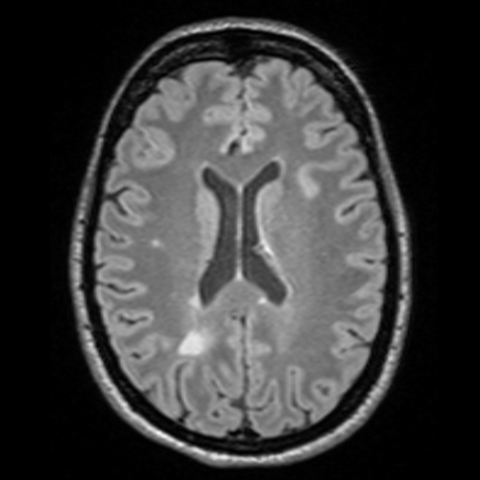For better treatment of multiple sclerosis
Joint press release by Charité – Universitätsmedizin Berlin and Max Delbrück Center
In multiple sclerosis, the immune system attacks the central nervous system. Depending on which nerve fibers are damaged, this can cause visual and sensory impairments, fatigue, difficulty concentrating, motor problems, and other neurological symptoms. Worldwide, there are over 2.8 million people living with this severe autoimmune disorder, some 1.2 million of them in the EU. Women make up 70 to 80 percent of patients. There is no cure for MS, but medications and other treatments can affect the course of the disease and bring more favorable outcomes. Achieving that requires treatment that is as individually tailored as possible.
“Our goal with the CLAIMS project ((„Clinical impact through AI-assisted MS care“) is to personalize the treatment of people with MS even more,” explains Professor Friedemann Paul, the coordinator of the initiative and the director of the Experimental and Clinical Research Center (ECRC), a joint institution of Charité – Universitätsmedizin Berlin and the Max Delbrück Center. “To that end, we plan to develop predictive models that can forecast the course of the disease for each individual patient based on their individual data and simulate the effects of different medications. Patient involvement will be a crucial element of this,” he says. CLAIMS will receive 9,9 million euros in funding over four years as part of the EU’s Innovative Health Initiative.
Holistic view of MS
MRI scan of the brain of a patient with multiple sclerosis. Nerve damage is visible as brighter areas.
To develop the platform, the consortium will bring together the clinical, scientific, technical, and communicative expertise of 15 public and private partners from nine different countries – from hospitals and universities to companies large and small and a foundation. The algorithms will be trained on clinical data such as MRI scans and the results of blood and eye tests over the course of the disease. Plans also call for an app that patients can use to enter information on their symptoms, how they are feeling, and financial burdens. This information will be pseudonymized and transmitted in accordance with data protection and privacy laws. Advanced AI models based on deep learning will be used to analyze the data. There are also plans for the platform to be able to factor in any additional diseases or health conditions the patient may have.
The goal is to arrive at a picture of an individual’s MS that is as holistic and detailed as possible. At the same time, the research team hopes to learn more about multiple sclerosis – such as how it develops, with or without attacks, flareups, or relapses. “We hope this holistic view will allow every individual MS patient to receive the right medication at the right time,” Paul explains. “I firmly believe this approach will allow us to make significant improvements in quality of life and prognosis for people with MS.”
- About CLAIMS
-
-
CLAIMS is one of the first five projects approved for funding as part of the Innovative Health Initiative. It is to receive about 9.9 million euros for a four-year term. About half the financing is being provided by Horizon Europe, the EU’s framework program for research and development, and industry partners. The 15 public and private partners involved in CLAIMS are: Charité – Universitätsmedizin Berlin (coordination; Germany), icometrix NV (project management; Belgium), Aalto University (Finland), AB Science SA (France), Bristol-Myers Squibb (USA), Casa di Cura iGEA SpA (Italy), the European Charcot Foundation (Belgium), F. Hoffmann-La Roche AG (Switzerland), Imcyse SA (Belgium), Nocturne GmbH (Germany), Ruhr-Universität Bochum (Germany), SYNAPSE Research Management Partners SL (Spain), Dresden University of Technology (Germany), University of Lille (France), and General University Hospital (VFN) in Prague (Czech Republic). Prof. Friedemann Paul, the coordinator of the initiative, is the director of the ECRC and head of the Clinical Neuroimmunology group at the Neuroscience Clinical Research Center (NCRC) at Charité. Grant Agreement No. 101112153.
- About the Innovative Health Initiative (IHI)
-
-
The Innovative Health Initiative (IHI) is a partnership between the European Union and European industry associations representing the pharmaceutical, medical technology, biotechnology, digital health and vaccine industries. Its core goals are to translate health research and innovation into real benefits for patients and society, and ensure that Europe remains at the cutting edge of interdisciplinary, sustainable, patient-centric health research.
Further information
Download
Contacts
Prof. Dr. Friedemann Paul
Direktor des Experimental and Clinical Research Center (ECRC)
Charité – Universitätsmedizin Berlin und Max Delbrück Center
Tel.: +49 30 450 539 705 / 450 540 012
friedemann.paul@charite.de
- Charité – Universitätsmedizin Berlin
-
-
With more than 100 departments and institutes across four campuses and 3,099 beds, Charité – Universitätsmedizin Berlin is one of Europe’s largest university medical centers. At Charité, the areas of research, teaching, and medical and patient care are closely interconnected. Averaging about 18,200 employees Charité-wide and some 21,600 across the entire group of companies, Berlin’s university medicine organization remained one of the capital city’s largest employers in 2022. More than 5,000 of those employees worked in nursing, over 5,200 in research and medicine, and more than 1,300 in administrative roles. Last year, Charité provided care for more than 126,000 inpatients and day case patients and about 736,900 outpatients. Charité posted approximately 2.3 billion euros in turnover in 2022, including external funding inflows and investment grants. Charité set a new record for external funding, at about 284 million euros. About 9,500 students are enrolled in programs in medicine, dentistry, health care sciences, and nursing here, at one of Germany’s largest medical schools. More than 800 traineeships in 12 healthcare professions and eight other professions are offered as well.
- Max Delbrück Center
-
-
The Max Delbrück Center for Molecular Medicine in the Helmholtz Association (Max Delbrück Center) is one of the world’s leading biomedical research institutions. Max Delbrück, a Berlin native, was a Nobel laureate and one of the founders of molecular biology. At the Center’s locations in Berlin-Buch and Mitte, researchers from some 70 countries analyze the human system – investigating the biological foundations of life from its most elementary building blocks to systems-wide mechanisms. By understanding what regulates or disrupts the dynamic equilibrium in a cell, an organ, or the entire body, we can prevent diseases, diagnose them earlier, and stop their progression with tailored therapies. Patients should benefit as soon as possible from basic research discoveries. The Max Delbrück Center therefore supports spin-off creation and participates in collaborative networks. It works in close partnership with Charité – Universitätsmedizin Berlin in the jointly run Experimental and Clinical Research Center (ECRC), as well as with the Berlin Institute of Health (BIH) at Charité and the German Center for Cardiovascular Research (DZHK). Founded in 1992, the Max Delbrück Center today employs 1,800 people and is funded 90 percent by the German federal government and 10 percent by the State of Berlin.







